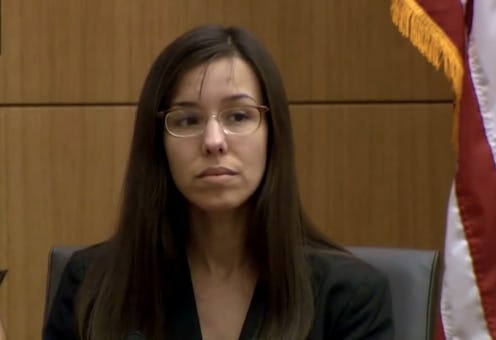News
Jodi Arias Escapes The Death Penalty

For a second time, the jury was unable to reach a unanimous verdict for the sentencing of Jodi Arias, the young Arizona artist who was convicted in May 2013 of murdering her ex-boyfriend, Travis Alexander. A hung jury on the death penalty forced Maricopa County Superior Court Judge Sherry Stephens to declare a mistrial in the sentencing phase of the case. Under Arizona law, Arias is now unable to be tried again for the death penalty.
This second penalty retrial came after the initial jury was unable to decide whether Arias deserved 25 years to life in prison or the death penalty for her brutal crime — something that even a new round of jurors can't seem to agree on. On Thursday, the sentencing was reminiscent of that day nearly two years ago, with another jury deadlocked and Arias and her team of defense attorneys relieved. Sobs and cries, presumably from the Alexander family, could be heard in the background on the live courtroom feed.
A sentencing hearing has now been scheduled for April 13, and her fate is now in the hands of Judge Stephens. With the death penalty officially off the table, Arias now faces life in prison or the eligibility for release in 25 years. However, even if Stephens finds Arias eligible for early release, it's not always guaranteed.
Although the first jury agreed on the first-degree murder conviction in 2013, the jurors could not unanimously vote on the death penalty, resulting in a hung jury. The initial jury deliberated on the sentencing for more than 13 hours, eventually handing down the "non-unanimous agreement" verdict.
Arias was convicted of premeditated murder for stabbing and shooting Alexander in his Arizona home in June 2008. Alexander was reportedly found with his throat slit and a gunshot wound in his head.
Arias testified in court in 2013 that she acted in self-defense, and her counsel tried to argue that it was justifiable homicide. Arias' alleged sexual abuse experienced as a child was also brought up repeatedly in court, as defense attorneys tried to paint a portrait of a troubled young woman plagued by past traumatic experiences.
After days of deliberation, it seems the 12-person jury is still torn on the bewildering murder that gripped the nation's attention, largely due to Arias' strange behavior, her alleged sexual abuse, and her stature as an attractive, innocent-looking young woman. As TV personality — and lover of alleged female criminals — Nancy Grace said on her show just minutes before the verdict was read on Thursday, this case had "everything": sex, murder and intrigue.